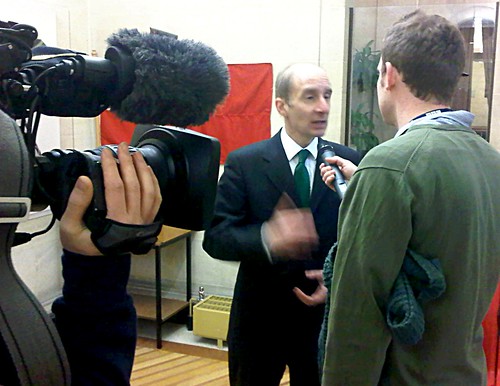All interviews by a journalist of your principal or organization should be monitored.

First, you must perform a check on any possible mis-readings or errors by the reporter. Second, monitoring the interview will provide you with a better understanding of the points your principal wants to stress. Finally, you will be able to perform a more effective follow-up with the reporter, something that can be especially important if the principal makes a mistake during the interview.
While monitoring the interview pay close attention to ensure the principal does not make any factual errors. If he or she gets a number or date wrong, you need to fix it. In the event the error occurs during a broadcast interview, it will be up to you to encourage the reporter not to make use of that particular sound bite.
 At times you may need to either play up or play down certain points by your principal. This can be a challenge as reporters often view this strategy as a blatant form of spin. In some instances, you may have additional facts not mentioned by the principal that serve to strengthen the main point and will be relevant to the reporter. You can do this through the follow-up. By sending additional points through email you can reinforce points you would like to see appear within the story.
At times you may need to either play up or play down certain points by your principal. This can be a challenge as reporters often view this strategy as a blatant form of spin. In some instances, you may have additional facts not mentioned by the principal that serve to strengthen the main point and will be relevant to the reporter. You can do this through the follow-up. By sending additional points through email you can reinforce points you would like to see appear within the story.
You also need to consider whether you want to record the interview. There may be little value in recording an interview unless it is a one-time interview and you anticipate a biased story. Blatantly recording an interview sends a message to the reporter that you do not trust them. If it is your goal to establish a long-term relationship with a reporter conducting an interview, you must work toward building a degree of trust. That may mean not recording the interview.
To learn more about effective public relations strategies, consider TheCapitol.Net’s 1-day course Media Relations for Public Affairs Professionals, and the 2-day Advanced Media Relations Workshop.
Reference: Media Relations Handbook, by Brad Fitch, Section 8.12 Things to Monitor during the Interview.
For more information about media training from TheCapitol.Net, see these resources:
- Media Relations Handbook, by Bradford Fitch
- Live courses in Washington, DC:
- Media Relations for Public Affairs Professionals: Media Relations 101
- Advanced Media Relations Workshop
- Effective Executive Briefings: The Art of Persuasion
- Capitol Hill Workshop
- Capitol Learning Audio Courses:
- Maximizing the Internet for the Public Affairs Professional, with Michael Cornfield
- Media Relations for the Public Affairs Professional, A Seven Course Series
- Public Affairs Primer for Nonprofits and Associations
- Media Relations: Merging Policy and Media Strategies
- How the Media Works and How to Work the Media
- Press Conferences and Media Interviews for Scientists and Engineers
For more than 40 years, TheCapitol.Net and its predecessor, Congressional Quarterly Executive Conferences, have been teaching professionals from government, military, business, and NGOs about the dynamics and operations of the legislative and executive branches and how to work with them.
Our custom on-site and online training, publications, and audio courses include congressional operations, legislative and budget process, communication and advocacy, media and public relations, testifying before Congress, research skills, legislative drafting, critical thinking and writing, and more.
TheCapitol.Net is on the GSA Schedule, MAS, for custom on-site and online training. GSA Contract GS02F0192X
TheCapitol.Net is now owned by the Sunwater Institute.
Teaching how Washington and Congress work ™

